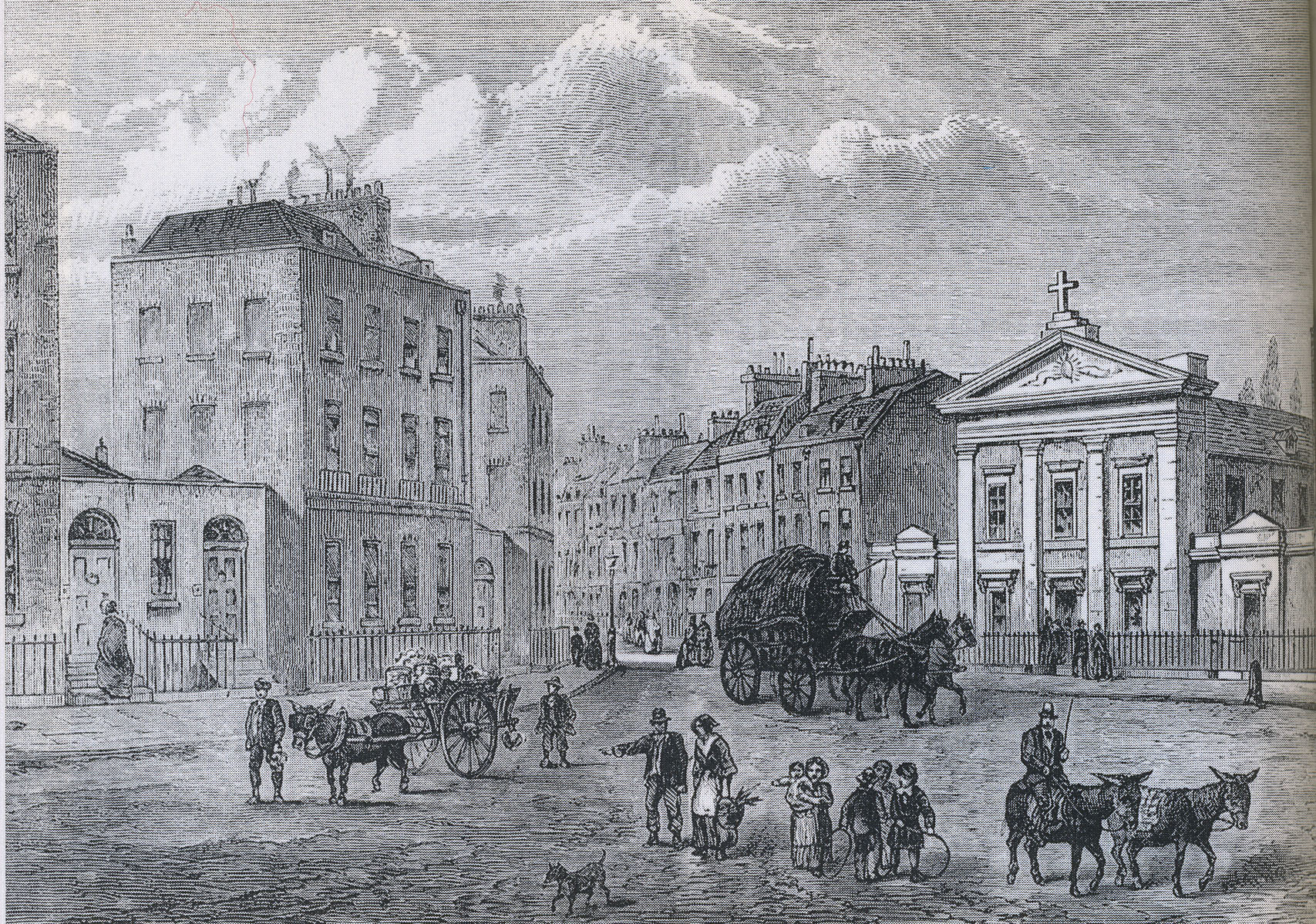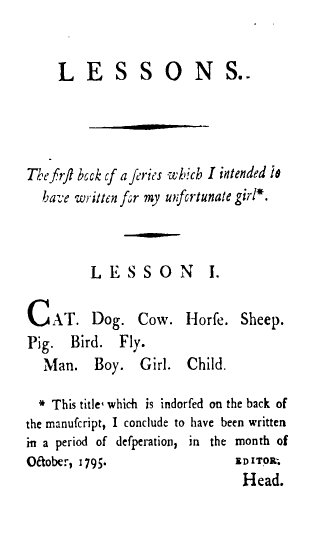Fanny Imlay
Encyclopedia, Science News & Research Reviews
Introduction
Francis Imley (14 May 1794 – 9 October 1816), also known as Fanny Godwin and Francis Wollstonecraft, was the English feminist Mary Wollstonecraft and American commercial speculator was the illegitimate son of diplomat Gilbert Imley. Wollstonecraft wrote about her frequently in her later work. Fanny grew up in the household of his mother's widow, the anarchist political philosopher William Godwin, with his second wife Mary Jane Claremont and five children. Fanny's half-sister Mary grew up to write Frankenstein and married Percy Bysshe Shelley, a leading Romantic poet who wrote poems about Fanny's death. Gilbert Imley and Mary Wollstonecraft lived happily together for a short time before and after Fanny's birth, but left Wollstonecraft behind in France during the Revolution. In an attempt to mend the relationship, Wollstonecraft traveled to Scandinavia on his job with one-year-old Fanny, but the relationship never rekindled. After falling in love with and marrying Godwin, Wollstonecraft died shortly after giving birth in 1797, leaving three-year-old Fanny and newborn daughter Mary in Godwin's hands. Four years later, Godwin remarried and his new wife, Mary Jane Claremont, had two children of her own in marriage, most importantly Claire Claremont. Wollstonecraft's daughters resented the new Lady Godwin and the attention she gave her daughter. As tensions escalated and debts increased, the Godwin family became an increasingly inhospitable place to live. In 1814, teenage Mary and Claire escaped to the continent with Shelley. Left alone, Fanny bore the brunt of her stepmother's wrath. She became increasingly isolated from her family and died by suicide in 1816.
Scholarly Articles
= Birth =
Fanny Wollstonecraft was the daughter of British feminist writer Mary Wollstonecraft and American entrepreneur Gilbert Imlay. Both had immigrated to France during the French Revolution, and Wollstonecraft sought to practice the principles laid out in her seminal work Defending the Rights of Women (1792), while Imlay was a speculator. had emigrated to engage in business. The two met and fell in love. At one point during Wollstonecraft and Imlay's dating, the couple could only meet at a toll booth between Paris and Neuilly, where their daughter became pregnant. Fanny was therefore, in Godwin's words, a "barrier child". Francis "Fanny" Imley, the first child of the Wollstonecraft Company, was born in Le Havre on May 14, 1794, the 25th of Floréal in the second year of the Republic according to his birth certificate. Named after Fanny Brad of Close friend. Imley never married Wollstonecraft, but registered her as his wife with the American Consulate to protect her after Britain and France went to war in February 1793. Most people, including the Wollstonecraft sisters, assumed they were married, and so was Fanny. She was legal and registered as such in France.
= Infancy and early childhood =
= Childhood =
= Teenage years =
Godwin never cuts short, but wrote about the differences he felt between his two daughters: My own daughter [Mary] is considerably better in her abilities than the daughter her mother had before. Fanny, the eldest, is quiet, reserved, and unobtrusive, with a bit of laziness, which is her biggest flaw, but she is calm and observant, has an unusually clear and clear memory, and can think for herself. tend to work and follow. her own judgment. My daughter Mary is in many ways the opposite of her. She is very bold, somewhat arrogant and has a lively spirit. Her appetite for knowledge is very high and her patience with everything she tackles is almost unbeatable. I think my own daughter is very cute. Fanny isn't handsome by any means, but she's generally good-natured. By coming into contact with the literary and political worlds where Godwin was active, the girls' intellectual world expanded. For example, while former US Vice President Aaron Burr was in voluntary exile from the United States after being acquitted of treason charges, he often spent time with the Godwins. He greatly admired Wollstonecraft's work and educated his daughter according to the precepts of Women's Rights. He wanted to meet the daughters of the women he looked up to, calling Fanny, Mary and Claire "Gods". He spent most of his time with Fanny discussing topics of politics and education. Burr was so impressed with the Lancastrian method of education that in 1811 he took Fanny to a model school.
== Percy, Mary, and Claire ==
= Theories =
= Suicide and aftermath =
On the evening of 9 October, Fanny checked into the Mackworth Arms Inn in Swansea and instructed her handmaiden to leave her out of the way. That same night, Mary Godwin, who was staying in Bath with Shelley, received a letter Fanny had previously posted from Bristol. Her father in London also received the letter. Due to the alarming nature of the letter, Godwin and Shelley both immediately left for Bristol (although they traveled separately). By the time she was tracked to Swansea on 11 October, it was too late. Fanny was found dead in her room on October 10 after ingesting a lethal dose of laudanum, leaving Sherry alone to deal with the situation. Fanny left an unaddressed note describing herself as "unhappy", presumably because Mary Wollstonecraft wrote in a note she wrote to "The Lesson" before she attempted suicide herself. It may refer to his description of her as "my unhappy girl". For a long time the best I could do was to put an end to the existence of a being whose birth was unhappy and whose life was nothing but a series of pains for those who tried to promote her. I have decided that it is. welfare. Perhaps hearing of my death will afflict you, but soon you will have the blessing of forgetting that such a creature once existed. The note appears to have originally been signed, but the names were cut out or burned so that the corpse's identity could not be determined. Therefore, when the announcement was published in the local newspaper Cumbria, Fanny was not specifically mentioned. At the inquest, Fanny was pronounced "dead" rather than suicidal or insane, thus saving her body from various humiliations. . Todd speculates that Shelley arranged for Fanny to be pronounced "dead" (a term often used by wealthy people), and removed all identifying information, including Fanny's name on the note. are doing. She also concluded that he refused to take her body to protect the rest of his family. Fanny's body was left unclaimed and was probably buried in a poor man's grave. In fact, Godwin wrote Percy Shelley: Do nothing to overshadow this incident she so wanted. Like I said, it was her last wish... Now think about what my wife and I are in, deprived of all but our youngest son [William]. And do not subject us to these vain questions, one of the most severe trials of the tortured mind. We are at this point wondering whether I should tell you what I had always thought, during the first shock, that she was going to Ireland to see her aunt... I feared more than anything. What I feel is a public newspaper. & Thank you for your attention as it may affect this. At the time, suicide was considered scandalous, unpopular and sinful, and may have damaged Godwin's business, so the family told various stories about Imre's death to cover up the facts. If she caught a cold in Wales, or that Fanny died of an 'inflammatory fever', or that she lived with her mother's sisters, or had to admit to suicide, Shelley would have been Mary Godwin instead of herself. Fanny committed suicide because she loved. Neither Percy nor Mary mention Fanny's death in their surviving letters from this period. Clare Claremont, in a letter to Byron, claimed that Percy had fallen ill because of her death, but, as Holmes points out, there is no other evidence to support this claim. But Locke writes that Shelley told Byron that just two months later, Fanny's suicide was "much more painful" than Harriet's. The poem quoted at the beginning of this article. As Seymour writes, "This article, published by Mary without comment, has always been taken as an allusion to her final encounter with her half-sister."
Science News
Videos
Dictionary
Definition & Meaning
Fanny
Noun
- the fleshy part of the human body that you sit on external female sex organs
Imlay




























